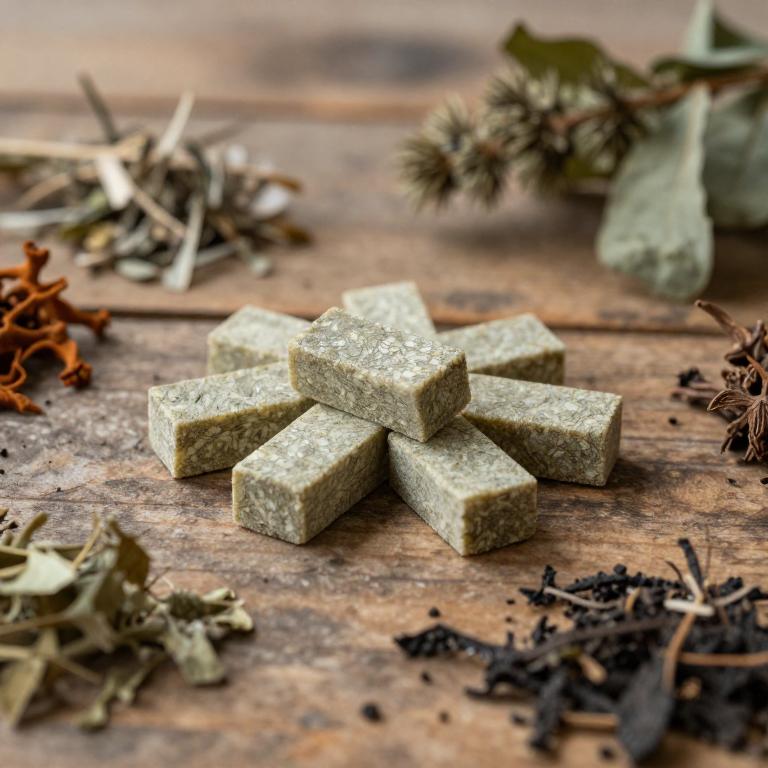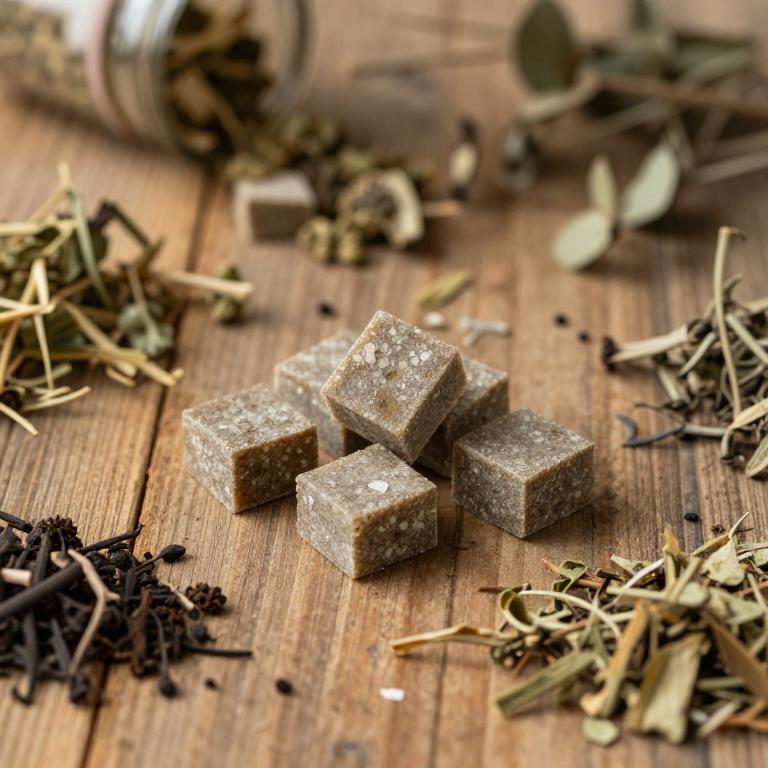10 Best Herbal Lozenges For Bad Breath

Herbal lozenges are a natural and effective remedy for combating bad breath, offering a pleasant alternative to conventional mouthwashes.
These lozenges often contain ingredients like peppermint, licorice root, and eucalyptus, which help freshen the mouth and reduce bacterial growth. The slow dissolution of the lozenge allows for prolonged release of active ingredients, providing sustained oral freshness throughout the day. Additionally, many herbal lozenges are free from artificial additives, making them a safe choice for daily use.
They are particularly beneficial for individuals seeking a gentle, natural solution to maintain oral hygiene and freshen their breath.
Table of Contents
- 1. Salvia (Salvia officinalis)
- 2. Peppermint (Mentha piperita)
- 3. Ceylon cinnamon (Cinnamomum verum)
- 4. Fennel (Foeniculum vulgare)
- 5. Licorice (Glycyrrhiza glabra)
- 6. Ginger (Zingiber officinale)
- 7. Rosemary (Rosmarinus officinalis)
- 8. Eucalyptus (Eucalyptus globulus)
- 9. Oregano (Origanum vulgare)
- 10. Black pepper (Piper nigrum)
1. Salvia (Salvia officinalis)

Salvia officinalis, commonly known as sage, is a popular herb used in the formulation of herbal lozenges designed to combat bad breath.
These lozenges work by releasing essential oils that help neutralize oral bacteria, which are a primary cause of halitosis. Sage contains compounds like thujone and cineole that have antimicrobial properties, making them effective in reducing the buildup of odor-causing microbes in the mouth. The natural aroma of sage also provides a pleasant, refreshing sensation, enhancing the overall oral experience.
As a natural alternative to conventional breath fresheners, sage lozenges offer a safe and effective solution for maintaining fresh breath throughout the day.
2. Peppermint (Mentha piperita)

Mentha piperita, commonly known as peppermint, is a popular herbal ingredient used in lozenges to combat bad breath due to its fresh, cooling aroma and natural antimicrobial properties.
These lozenges help neutralize odor-causing bacteria in the mouth, providing a refreshing and long-lasting effect. The menthol in peppermint stimulates saliva production, which naturally cleanses the mouth and reduces the buildup of odor-causing substances. Peppermint lozenges are a convenient and effective option for people seeking a natural remedy for temporary bad breath.
They are generally safe for most adults and can be used as part of a daily oral care routine to maintain fresh breath.
3. Ceylon cinnamon (Cinnamomum verum)

Cinnamomum verum, also known as true cinnamon, is commonly used in herbal lozenges to combat bad breath due to its natural antimicrobial properties.
These lozenges work by neutralizing odor-causing bacteria in the mouth, providing a fresh and pleasant aroma. The essential oils in cinnamon help to soothe sore throats and reduce oral inflammation, making them a versatile remedy for oral health. They are a popular alternative to synthetic mouthwashes, offering a natural and flavorful solution.
Regular use of cinnamon lozenges can help maintain fresh breath throughout the day without the harsh side effects of chemical-based products.
4. Fennel (Foeniculum vulgare)

Foeniculum vulgare, commonly known as fennel, is a herbal remedy often used in the form of lozenges to combat bad breath.
These lozenges work by releasing essential oils that help neutralize odor-causing bacteria in the mouth. The active compounds in fennel, such as anethol and limonene, possess natural antimicrobial and anti-inflammatory properties that support oral health. Regular use of fennel lozenges can freshen breath and reduce the risk of gum disease and other oral infections.
As a natural alternative to conventional breath fresheners, fennel lozenges offer a safe and effective way to maintain fresh breath throughout the day.
5. Licorice (Glycyrrhiza glabra)

Glycyrrhiza glabra, commonly known as licorice root, is often used in herbal lozenges to help alleviate bad breath due to its antimicrobial and anti-inflammatory properties.
These lozenges work by reducing the bacterial load in the mouth, which is a primary cause of persistent bad breath. The natural compounds in licorice, such as glycyrrhizin, may also help soothe irritated oral tissues and promote a healthier oral environment. Additionally, the pleasant taste of licorice makes these lozenges more appealing for regular use.
However, long-term use should be monitored, as licorice can have side effects such as increased blood pressure in some individuals.
6. Ginger (Zingiber officinale)

Zingiber officinale, commonly known as ginger, is a popular herbal ingredient used in lozenges to combat bad breath due to its natural antibacterial and anti-inflammatory properties.
These lozenges work by neutralizing odor-causing bacteria in the mouth and promoting saliva production, which helps to cleanse the oral cavity. Ginger also has a refreshing taste that can mask unpleasant odors and provide a pleasant sensation when dissolved. Regular use of zingiber officinale herbal lozenges can be an effective, natural alternative to conventional mouthwashes for maintaining fresh breath.
However, individuals with gastrointestinal sensitivities should use them with caution, as ginger can sometimes cause stomach upset.
7. Rosemary (Rosmarinus officinalis)

Rosmarinus officinalis, commonly known as rosemary, is a popular herb used in the formulation of herbal lozenges designed to combat bad breath.
These lozenges work by releasing natural antioxidants and antimicrobial compounds that help neutralize oral bacteria responsible for unpleasant odors. The essential oils in rosemary, such as cineole and camphor, have been shown to freshen the mouth and promote saliva production, which further aids in reducing odor-causing agents. Regular use of rosemary lozenges can provide a natural, long-lasting solution for maintaining fresh breath without the use of synthetic additives.
As a result, these herbal lozenges are an effective and safe alternative for individuals seeking holistic oral care.
8. Eucalyptus (Eucalyptus globulus)

Eucalyptus globulus herbal lozenges are a natural remedy designed to combat bad breath by leveraging the antibacterial and deodorizing properties of eucalyptus oil.
These lozenges help neutralize odor-causing bacteria in the mouth, offering a fresh and clean breath without the use of artificial additives. The menthol-like cooling effect of eucalyptus provides a refreshing sensation, making them ideal for daily use. They are particularly beneficial for individuals seeking a natural alternative to conventional breath fresheners.
Regular use of these lozenges can contribute to improved oral hygiene and long-term breath freshness.
9. Oregano (Origanum vulgare)

Organum vulgare, commonly known as oregano, is a powerful herb often used in herbal lozenges to combat bad breath due to its strong antimicrobial properties.
These lozenges work by neutralizing odor-causing bacteria in the mouth, helping to freshen breath naturally without the use of artificial additives. The essential oils in oregano, particularly carvacrol, have been shown to inhibit the growth of harmful bacteria that contribute to halitosis. Regular use of oregano vulgare lozenges can provide long-lasting relief and support oral hygiene.
They are a safe and effective alternative for those seeking natural remedies for persistent bad breath.
10. Black pepper (Piper nigrum)

Piper nigrum, commonly known as black pepper, is a traditional herbal remedy that has been used for centuries to address various health concerns, including bad breath.
The active compound in black pepper, piperine, possesses antimicrobial properties that can help eliminate odor-causing bacteria in the mouth. Piper nigrum herbal lozenges are designed to dissolve slowly in the mouth, releasing these beneficial compounds for prolonged freshness and oral hygiene. These lozenges are a natural alternative to conventional breath fresheners, offering a mild, spicy flavor that can stimulate saliva production and reduce bacterial buildup.
Regular use of piper nigrum lozenges may contribute to improved breath quality and overall oral health.